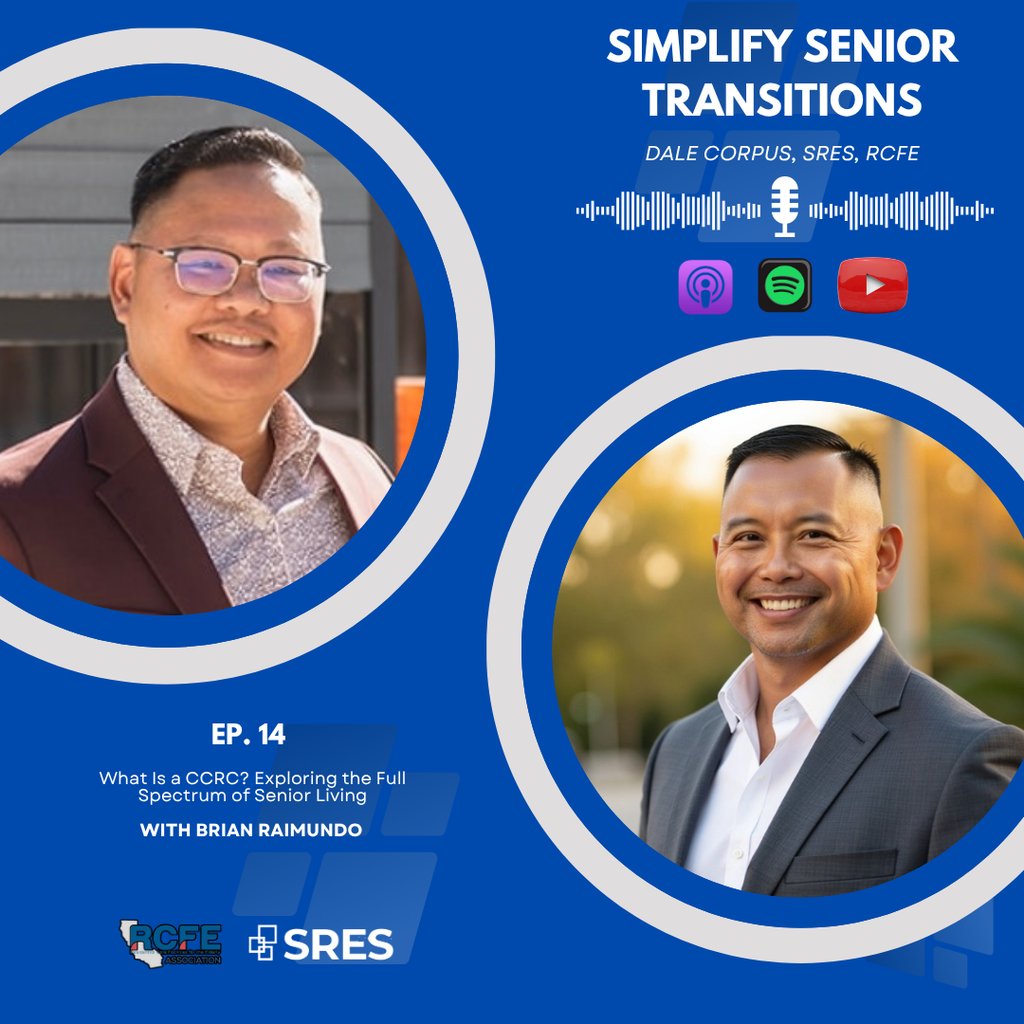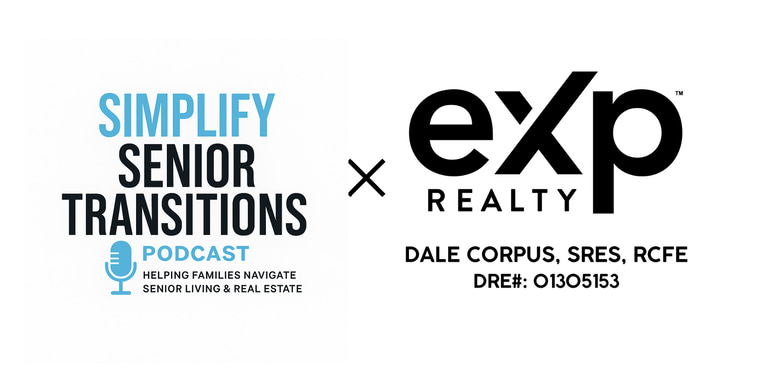Is a CCRC Right for Your Parents? What You Need to Know About Aging in Place
Brian Raimundo of Acacia Creek explains how Continuing Care Retirement Communities work—and why they offer peace of mind during life’s toughest transitions
Dale Corpus
4/24/20255 min read
Navigating the Journey of Senior Living Transitions
Navigating the journey of senior living transitions for your aging parents can feel overwhelming, like trying to solve a complex puzzle with pieces scattered everywhere. From understanding different care options to managing the emotional weight of a move, it's a lot to process. That's why we're here to simplify the process and connect you with expert insights.
In a recent episode of the Simplify Senior Transitions Podcast, our host Dale Corpus, a senior transition specialist and real estate expert, sat down with Brian Raimundo, a distinguished guest with a robust background in business development across various senior care sectors. Brian currently excels in sales and development at Acacia Creek Retirement Community and is the co-founder of the East Bay Senior Round Table, a network dedicated to enhancing the quality of life for seniors in our community. His personal journey, driven by the challenges he faced navigating healthcare for his own father, fuels his passion to be a consultative resource rather than just a salesperson—making his insights incredibly valuable for families like yours.
Here's What You'll Learn in This Episode:
What a Continuing Care Retirement Community (CCRC) is and how it offers a comprehensive solution for aging in place.
Acacia Creek’s unique offerings, including its diverse levels of care, extensive amenities, and financial model.
The origins and mission of the East Bay Senior Round Table, a vital network of trusted senior care professionals dedicated to supporting families.
Practical tips and insights for addressing common family challenges such as downsizing, choosing the right care options, and managing the emotional aspects of transitioning parents.
Understanding Continuing Care Retirement Communities (CCRCs)
A CCRC, as Brian explains, offers multiple levels of care all on the same campus. This typically starts with independent living, progressing to assisted living, memory care, and often includes on-site skilled nursing.
The core benefit of a CCRC is its "age-in-place" model. This means that as your parent's needs change—perhaps they require more support with daily activities or even long-term skilled nursing care—they don't have to move or search for another community. This continuity is a huge relief, especially during a crisis or when higher levels of care, like long-term skilled nursing, are notoriously difficult to find.
You might have heard about a "buy-in fee" associated with CCRCs. Brian clarifies this is more accurately called an entrance fee, and it's not like buying property. He compares it to a "life insurance policy and a savings account." This fee guarantees medical care and housing for the rest of your parent's life. In the event that their finances for monthly fees (which are like rent) run out, the entrance fee can become a "spend-down account" to ensure they continue to receive care.
While some CCRCs, especially in California, can have substantial entrance fees (sometimes $1–2 million or even deposits like $95,000 for Acacia Creek), Brian acknowledges that this model is a niche market. Many families opt for this by selling their home.
Acacia Creek: A Unique & Comprehensive Community
Acacia Creek, located in Union City in the East Bay Hills (34400 Mission Boulevard), stands out. It’s owned by the Masonic Home of Union City and is a non-profit organization, which is uncommon in the industry. This contributes to its financial stability and a mission not to "kick people out."
Although it opened in 2010 initially for Freemasons, it's now open to the public, with about 50% of residents being Masons and 50% from the general public.
Acacia Creek provides a full spectrum of care:
Independent Living: Residents live in apartments, but the community is licensed for assisted living, meaning they can receive services like bathing and dressing in their own apartment on a "pay as you go" basis if needed.
Assisted Living (The Pavilion): For those needing 24/7 supervision, the Pavilion offers a "small house model" with private studios and kitchenettes, a nurse on site 24/7, and communal dining and activities. Pets are allowed here.
Memory Care (Wallenburg): Also a small house model with private studios and bathrooms, located at the front of the campus (pets are not allowed here).
Skilled Nursing Facility: A 125-bed facility on campus, primarily for residents but also open to the public from local hospitals.
Beyond care, Acacia Creek offers an extraordinary "resort feel." Imagine two indoor pools, a full gym, a dance studio with chair fitness and yoga, pickleball courts, putting greens, and even a mini driving range.
They also feature:
Two wood shops (run by residents!)
A sewing studio and ceramic room
An urgent care clinic, pharmacy, and mini general store
A flight simulator for retired pilots
An FAA-approved mini landing strip for radio-controlled airplanes
This comprehensive approach often makes it feel like a "small town" or even a "luxury cruise ship." While most residents (80%) come from the Bay Area (South Bay, Peninsula, Fremont), Brian also sees people moving from states like Michigan and Ohio, highlighting the community's unique appeal.
Navigating Senior Transitions: Finding Support and Solutions
Brian's personal story is a powerful reminder of the emotional and practical challenges families face when a parent's health declines. His experience navigating his father's diagnosis and the complexities of home health, hospice, and caregiving motivated him to become an expert and a trusted resource.
He understands that you're likely dealing with your parents' biggest concern—their crisis in life—and his goal is to provide solutions.
When it comes to choosing care, Brian encourages families to explore all options, including other CCRCs or even non-CCRC communities, to ensure they make an informed decision. He emphasizes considering the future, reminding families that if a parent develops a condition like Alzheimer's, a non-CCRC might necessitate another disruptive move.
For those in the Bay Area (Alameda, Contra Costa, Santa Clara, San Mateo, San Francisco, Solano, Napa counties), a crucial resource is the East Bay Senior Round Table, co-founded by Brian. Its core mission is to be a collaborative group of trusted senior care professionals.
If Brian can't personally help a family with a specific need, he wants to be able to redirect them to someone he has "100% faith" in, who won't "drop the ball." This network truly functions as a "one-stop shop" of professionals, including experts in senior living, home care, home health, and real estate, like Dale Corpus.
They meet monthly, often at different senior communities, providing members with valuable insights and access to various options. This collaborative spirit ensures that families grappling with challenges like downsizing a senior’s home, choosing between complex care options, or managing the emotional stress of transition, have a reliable network to turn to.
Your Next Step
Just as a skilled navigator uses a comprehensive map and trusted instruments to guide a ship through complex waters to a safe harbor, you can navigate your parents' senior living journey by understanding all the options and leveraging a network of trusted professionals.
Are you feeling overwhelmed by the thought of helping your loved one transition to senior living, or wondering what to do with their home? Schedule a FREE consultation with Dale Corpus by clicking on the Calendly link located in the video description box for this episode on YouTube or by visiting www.simplifyseniortransitions.com.
We encourage you to listen to the full episode for all the detailed insights, or reach out to Dale directly via Instagram @soldbydale for quick questions.
P.S. Got news or an amazing story to share? Hit us up at dale.corpus@exprealty.com and you might be featured in our next episode!
Remember, always check out the transcript for detailed insights. Happy listening! 🎙️
Watch The Podcast Here



Transitions Made Simple
Helping seniors transition with ease and peace.
📍 Serving the San Francisco Bay Area
📞 GET IN TOUCH
📬 STAY INFORMED
Dale Corpus, SRES, RCFE
📱 925-380-1657
📧 dale@simplifyseniortransitions.com
🕓 Available for free 15 min consultations by appointment
© 2026. All rights reserved.
Sign up for monthly senior transition tips & real estate insights.
